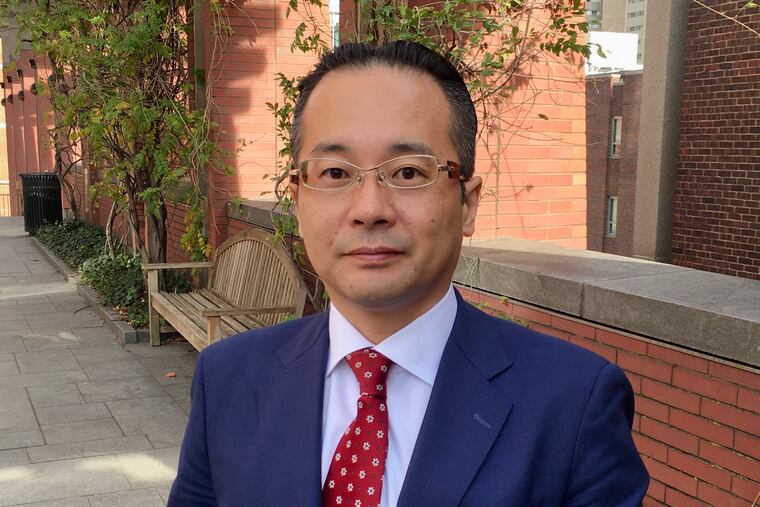Why Japanese investor activists are picking the brains of some Philly-area experts
They are meeting with corporate-governance scholars in the region as they scout ways to pressure managers of troubled companies back home.

Leaders of a nascent activist-shareholder movement in conservative Japan have been passing through Philadelphia and meeting with corporate-governance scholars in the region as they scout ways to pressure managers of troubled companies back home.
“In Japan, there has been a very limited sharing of information by companies,” said Naoki Matsuoka, a lawyer from Osaka who represents a group of shareholders in Sekisui House.
Though its shares are up this year, Sekisui House, a $22 billion (yearly sales), multinational home builder based in Japan, has faced unaccustomed conflict since chairman Isami Wada was ousted last summer. The push came from executives he blamed for a $51 million loss due to a property purchase blunder, in a boardroom coup backed by directors who owed their jobs to those same executives.
“Even if the company has a scandal and the company investigates, the findings are not shared with the shareholders,” and that’s what’s happened at Sekisui House, Matsuoka said.
At Sekisui House, insiders holding a majority of board seats ousted chairman Wada when he demanded that top executives be held responsible for the fraud. That outcome “could not have happened at a New York Stock Exchange company,” where a majority of board seats must be held by outsiders, said William Uchimoto, a veteran Berwyn-based securities lawyer (and son of Japanese immigrants) who has been working with the Sekisui House dissidents since last year.
Sekisui executives acknowledged in a statement last month that they are facing pressure from an investor they didn’t identify to have the company join a legal complaint against chairman Toshinori Abe and vice chairman Shiro Inagaki, who took control of the company after ousting Wada last year.
Matsuoka says he is representing the investor in that complaint. Wada, who visited Philadelphia last summer to confer with Uchimoto, blames Abe, Inagaki, and other insiders for instigating his ouster after they failed to take responsibility for the losses, even after an internal investigation pointed toward the pair. Sekisui House did not respond to inquiries seeking comment.
Among other steps, the activists plan a website, SaveSekisuiHouse.com, and are considering nominating a slate of rival directors — a step accommodated by Japanese securities law but almost unheard of in a business community that prizes harmony, Matsuoka and other lawyers said.
“This company is being run by only a few directors. The intention is to return the company to the shareholders and to make an updated plan for Sekisui House,” Matsuoka said in an interview. The planned website should help rally investors to demand new leadership, he said.
Over a breakfast of waffles and omelets on Monday, Uchimoto introduced Matsuoka and a group of colleagues to finance professor Michelle Lowry, head of Drexel’s corporate governance program, to review suggestions for the call-to-arms website.
The lawyers planned to travel later in the day to visit governance experts William Jannace and Peter Cachion, as well as Charles Elson, director of the John L. Weinberg Center for Corporate Governance at the University of Delaware. Tuesday, the plan was to visit activist investors in New York.
“They have a great story,” Elson told me. “You sometimes hear this kind of complaint from stateside [American] investors. It’s very rare that it comes from inside Japan. And that’s a good sign: They are taking care of their capital.”
Given last year’s vote against retaining directors, “they are within striking distance of winning [control of the company] if they can convince enough investors in Japan to support them.”
He noted that the International Corporate Governance Network recently gave its annual award to Sophie L’Helias, a veteran M&A lawyer and Kering Corp. director who has pushed for shareholders’ rights and gender equity at companies in her native France. D’Helias’ husband, François Delattre, was France’s ambassador to the U.S. Well-connected people with ties to national elites are often more effective advocates than outsiders, he noted.
Matsuoka said that in past Japanese corporate scandals, it was often the whistleblower, not company officials, who was placed on the hot seat. For example, in 2011, Japan-based cameramaker Olympus Corp. reacted to new British CEO Michael Woodford’s attempts to stop accounting fraud by serving him canned tuna while others ate sushi, then fired him. The company was eventually taken over by Sony Corp., and officials were prosecuted in both Japanese and U.K. courts.
Local government bribes at Japanese (corrected) nuclear electric power company Kepco earlier this year led to the quiet replacement of mid-level executives, but chairman Makoto Yagi left only after news outlets broke the scandal.
Last year, in another move that Japan observers said had few precedents, Sekisui dissidents helped convince an unusually large proportion of Sekisui investors to vote against retaining the senior officers who Wada says were tied to the fraud. But with no opposition, they retained their jobs and are still in control of the company, while the dissidents consider whether to mount a rival slate.